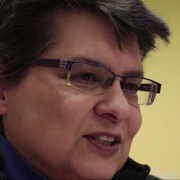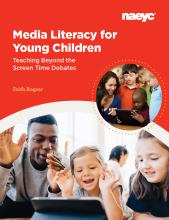Media Literacy for Young Children: Teaching Beyond the Screen Time Debates

About the Book
-
Use inquiry and media-making to teach children about media
-
Plan activities to engage children in meaningful media discussions
-
Engage with families about the importance of media literacy education for young children
-
Address media concerns with joy and creativity rather than anxiety or fear
Table of Contents
- Acknowledgments
- Start Here
-
Part I: Getting Ready
- Chapter 1: Media, Society, and Us
- Chapter 2: Visual Literacy
- Chapter 3: How We Make Meaning
- Chapter 4: Framing: How We Think About Our Work
-
Part II: Defining the Task
- Chapter 5: What Is This “Media Literacy Education” of Which You Speak?
- Chapter 6: Engaging Through Inquiry
- Chapter 7: Building Media Knowledge: Key Concepts
-
Part III: From Pedagogy to Practice
- Chapter 8: Integrating Media Literacy: Routines and Modifications
- Chapter 9: Integrating Media Literacy: Planned Activities
- Chapter 10: Engaging Families
- Chapter 11: Taking the Next Step
- Appendix A: 100 Words That Build Media Literacy Vocabulary
- Appendix B: Using Media Analysis Questions to Draw Conclusions About Media Effects Research
- Appendix C: Resources
- Index
- About the Author
Book Details
Related Resources
Articles
“Start with Wonder, Then Add Inquiry: Developing Young Children’s Media Literacy Competencies” - Faith Rogow outlines 10 competencies necessary for media literacy as well as provides guidelines that early childhood educators can follow to embed these competencies into their classrooms. (Teaching Young Children, December 2021)
“Play and Technology: An Important Intersection for Developing Literacy” – Victoria B. Fantozzi, Christi Porter Johnson, and Anneliese Scherfen discuss how, with thoughtful selection and integration, play and technology can work in tandem to support children's learning. (Young Children, May 2018)
“Technology and Interactive Media in Early Childhood Programs: What We’ve Learned from Five Years of Research, Policy, and Practice” – This article by Chip Donohue and Roberta Schomburg highlights consensus takeaways on a set of foundational elements necessary for successful technology integration with young children based on position statements, reports, research reviews, guidelines, and recommendations released between 2012 and 2017. (Young Children, September 2017)
Faith Rogow, PhD, is an independent scholar and longtime media literacy education innovator. In addition to Media Literacy for Young Children, she is the author of “Media Literacy in Early Childhood Education: Inquiry‑Based Technology Integration” in Chip Donohue’s,
ed., Technology and Digital Media in the Early Years (NAEYC & Routledge 2015). She’s also coauthor of The Teacher’s Guide to Media Literacy: Critical Thinking in a Multimedia World (Corwin 2012) and Media Literacy in Every Classroom: A Quick Reference Guide (ASCD 2017). For additional ideas, see her blog, TUNE IN Next Time, or follow her on Twitter @InsightersEd.

